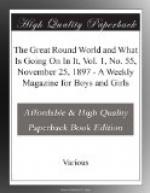FOOTNOTES:
[Footnote A: This is often written Hapsburg, probably because the b is pronounced very shortly and sharply, giving it much the sound of p. Habsburg is, however, correct, as the name is derived from Habicht, a hawk, and was originally Habichtsburg, the Hawk’s Castle, from which the family derived its name.]
There have been many revolts and uprisings in Hungary against the Austrian rule, and in 1867 the present arrangement was made, whereby Hungary paid thirty per cent. of the joint expenses of government. The compact, as it is called, was made for ten years. In 1877 and 1887 it was renewed for another period of ten years. Now in 1897 it must be renewed again.
Austria thinks Hungary is now in a position to pay a larger proportion of the expenses, but Hungary cannot see the force of this at all. She is, however, willing to make a fresh compact for one year, during which time the whole matter can be thoroughly discussed.
The attempt to get the compact arranged for the one year offered has been one of the causes of the trouble in the Reichsrath, or Parliament.
The Austrians do not want to renew the agreement unless they can get better terms, the Hungarians will not pay any more, and the Bohemians are opposed to every motion that is made, because they insist that their own grievance about the language shall be settled before any other business is done.
In consequence of this, the Austrian Parliament has become a bear-garden.
Mr. Clemens (Mark Twain), who happened to be in Vienna during these uproarious sittings of Parliament, and witnessed one of them, declared that the nearest approach to such a riot in his experience was the lynching of a man out West for stealing a horse—but even that was a mild scene compared to the proceedings of the Parliament.
While Mr. Clemens was watching, an Austrian member tried to speak on the Hungarian question; whereupon Mr. Wolff, the Bohemian member, began to slam the lid of his desk and then pound it with a ruler. A scuffle ensued in the attempt to wrench off the lid of the desk, during all of which the Austrian member continued to speak, it being utterly impossible to hear one word of what he was saying, because of the uproar made by the rest of these dignified lawgivers.
[Illustration: THE START OF THE ANDREE BALLOON.]
The haughty Hungarians have naturally become highly indignant over this conduct, and there have been stormy times in the Hungarian Parliament.
Francis Kossuth, a son of Louis Kossuth, the famous Hungarian patriot, is a member of the Lower House of the Hungarian Parliament. He created a sensation by demanding that Hungary should cut herself free from Austria and once more become an independent kingdom, as Austria did not seem to desire the renewal of the compact.




